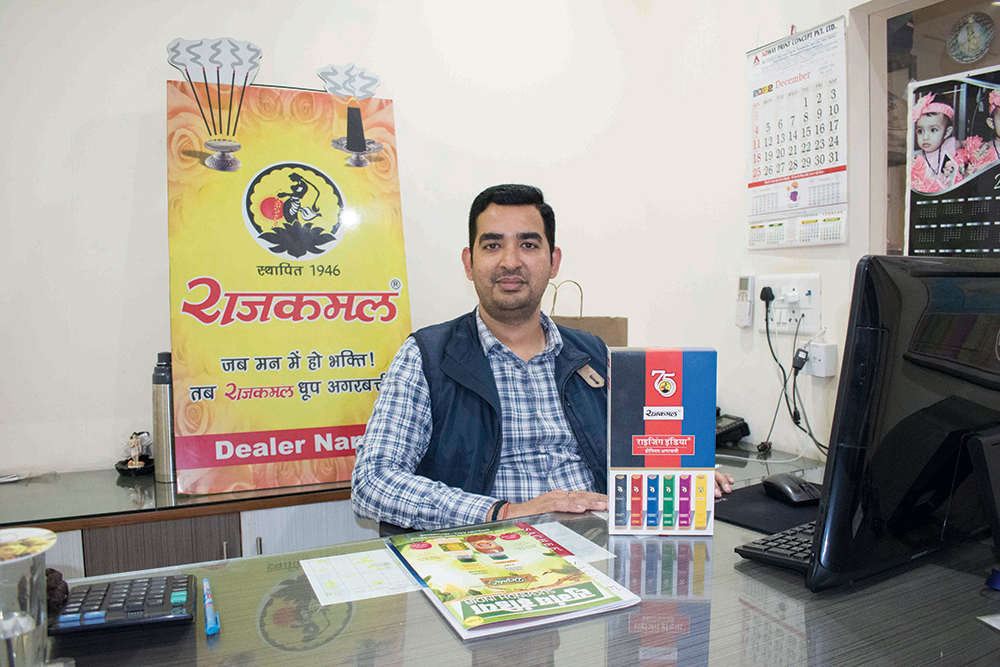
The incense market is a tough nut for new entrants : Vishal Kesarwani
-Prices of raw materials have doubled in the last 2 years.
-Competition is dithered. Only experienced players can survive.
Vishal Kesarwani, the CEO of Rajkamal Dhoop Agarbatti based in Noida revealed that the entry of new players in the dhoop & agarbatti business that drastically increased due to agarbatti making machines is declining as the situation has become impossible. It is the pandemic that brought stark changes in the business environment. He said that prices of raw materials have doubled and the competition has increased. The profits have decreased so much that we are selling on no profit no loss basis just to remain in the market. Due to such challenges, new entrants are getting thrown out, leaving only the established players. Every business requires patience but agarbatti industry requires more and specially in case of new entrants.
Going back in time, talking about how the firm was started, Vishal said “, The family business started a year before our country got independence. Late Shri Gopi Kishan Kesarwani and Late Shri Harikishan Kesarwani were founding fathers.
Khari Baoli, a locality established by the Mughals in Old Delhi, has always been the nerve centre for wholesale-purchase of spices, herbs and perfumes. My grandfather, while strolling in the ‘Khari Baoli’ market, found pieces of wood with an aromatic quality. He bought some and processed it into dhoop-stick. He started selling them and people liked them very much. That’s how our business started 75 years ago.” Continuing with his statement he said “, I’m in debt to the love, knowledge and experience I received from my father and grandfathers. This brought strength and wisdom, to deal with present challenges.” He said “, None of our products uses synthetic formulations. Raw materials we purchase are from the selected source. ‘Gopal Chhap Dhoop No. 1’ is the best example made from pure herbs and essential oils. It does not cause respiratory issues like asthma. It is the most expensive dhoop sold. It carries a legacy. Raw materials for this premium dhoop are sourced from Kashmir.”
The company has a bouquet of 250+ products; dhoop, agarbatti, roli, chandan, sindoor, kapoor, gulal and various products used in worship and devotion. Delhi NCR, Uttar Pradesh, Uttarakhand, Madhya Pradesh, Gujarat, Bihar and Rajasthan are the biggest markets for the company.
Sugandh India wanted to know how their business deals with soaring prices of raw materials and other manufacturing costs? To this, Mr Kesarwani responded “, This is beyond our control. The agarbatti market is dotted with zillion; products, dealers, distributors and unaccountable manufacturers leading to a scramble for competition. Despite the availability of raw materials, manufacturers like us face shortages, leading to soaring prices. In fact, the cost of raw materials has doubled in the last two years! Costly manufacturing added with different prices to move our brands to the last mile shrinks profits. Worst! We at times have to sell our products at loss just to stay in the market.” Briefing about his products he said “, Gopal Dhoop is sold in the range of Rs.700 to Rs.1000 a kilo. Gopal, Rajkamal, Prabhat and BD Care are our top-selling brands. Rajkamal is most popular in the economy segment sold in the range of Rs.5 to Rs.100.
Rajkamal brand of dhoop and agarbatti has been run by three generations of the Kesarwani family. This in itself is an achievement. Nonetheless, it wasn’t possible without active and honest participation from their suppliers and distributors.
Talking about this participation Vishal Kesarwani said “, Manufacturers actually don’t run this market: dealers and distributors do. They should be active and well-connected in moving your brand into the market. A nonchalant distributor can kill your brand. Adding more information he said “, The agarbatti market also runs on the system of credit. We have to deliver our stock and wait for payments. It’s a general trade practice without fringe benefits. Possibilities of money getting stuck or lost completely can’t be ruled out. Earlier, such cases were just two to three out of a hundred. Today it is five or even six. Novice entrepreneurs lose money more frequently.”
Describing a bit more about products he said “, Although, the trend for fancy and fruity fragrances like Pineapple and Lavender is on the rise… Traditional fragrances like; rose, mogra, chandan and kewra will always be in demand. Another point to note is that whenever a company comes up with a new range of products, initially it sells well and if it is good then it stays in demand”
Sharing hi views on new entrants, Mr. Kesarwani said,”Earlier 9 out of 10 new entrants would survive but the things are different now. Despite the incense industry growing at the rate of 9.1% CAGR— success-rate for newcomers is less than one percent. Moreover, they bear 20% more losses than three to four per cent by experienced players. The losses are due to credit offered in the market. With the onset of machines in the industry, there was an influx of new entrants in the industry, but alot of them could not survive due to high competition and rise of raw material prices. In such times not everyone can maintain good quality. The ones who can are the established brands and they bear the loses in a hope for a positive future. According to Vishal Kesarwani, UP is the most profitable market. He said “, Buying capacity is huge and the sellability encompasses all segments including our super-premium brands. Bihar too is a big market. Products ranging from Rs.5 to Rs.100, easily sell in these states. Rs.5, Rs.10 and Rs.20 packs sell most.
Sugandh India wanted to know about brand loyalty. Are customers loyal to a brand? To this, he responded “, Customers buy dhoop and agarbatti regardless of brand names. Customers don’t even know, who the manufacturer is. They are least bothered by such details. Two to three per cent of customers are brand conscious. Regarding advertising and promotions he remarked “, The idea is good but ain’t beneficial. I remember, our company ran a campaign in newspapers and hoardings in the early 90s. The campaign turned out to be the least responsive. To put it simply, the product has to be good. The rest is up to the retailer. I, sitting here, cannot guess which brand he’s suggesting to the customer. By the way… this is the job of our dealers and distributors. They push the envelope for us.”
Sugandh India wanted to know, why there is an excess of similar looking and sounding products in the market? Responding with an undertone Mr Kesarwani said “, Competition in this industry resonates through; being creative copycats. When a certain fragrance of a certain brand becomes too popular other companies develop similar fragrances in body and tone. The same goes for packaging. Well… this practice isn’t restricted to the incense industry alone. The concept is well-proven in other industries as well, for example; the automobile industry. The rear end of certain cars in a certain price segment looks quite similar. We introduce new products from time to time.”
Lastly, on future expansions Vishal Kesarwani, the CEO of the ‘Rajkamal Dhoop Agarbatti Company’ said “, This industry is expanding unregulated. Market turnover is 10–12 Thousand Crores. That does not mean every manufacturer is here to invest in hundreds of Crores. People stay within their business risks and the market they choose. Yes, there are lots of opportunities though one needs to be patient. New players must come prepared. They should have more patience along with business acumen. Fly-by-night companies in this trade automatically get thrown out.”




